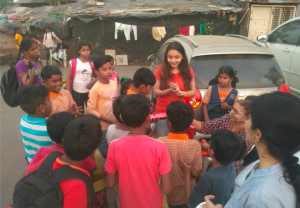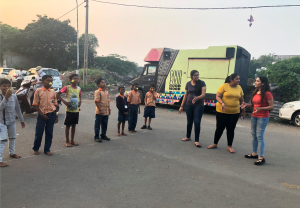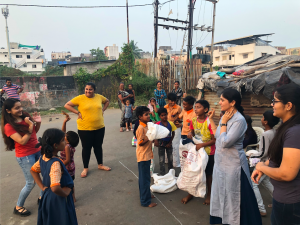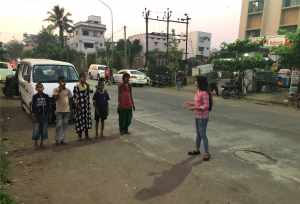In India, a significant fraction of the population lives in slums under adverse living conditions. There is disparity between the rich and poor. As part of my CAS project, I came up with an idea of going to various slums and making underprivileged children play traditional games: sack race and lemon and spoon race. We bought pouches, pens, etc. from the money we collected from people near our area and gave them to the winners as prizes so that they could use those at their schools.
L1 – Identify own strengths and develop areas for growth
This project taught me a lot about my strengths and weaknesses. My strength was that I was good at taking charge and interacting with the children. However, my weakness was that I often stressed out about conducting this project and lost focus sometimes.
L2 – Demonstrate that challenges have been undertaken developing new skills
Since this project had to be planned over the Diwali break, time management was a major challenge for me since I had to do a lot of submissions. I often lost focus since I had to do several tasks at the same time. However, I managed to overcome the challenges by taking breaks and staying relaxed and calm.
L3 – Initiate and plan a CAS experience
I came up with this idea during the Diwali break and shared it with my friends. I wanted to do the project over the break but all three of us were either out of town or busy and so we had to prolong the activity to the first week of school. The project was planned online or over the phone since we were not able to meet over the break.
L4 – Commitment to and perseverance
Commitment and perseverance in all three of us was necessary for this project. Though we were either traveling or busy with festivals and homework, we made sure that we made a conference call at least once a week or otherwise text each other to update ourselves with the progress of the project.
L5- Demonstrate skills and benefits of working collaboratively
Collaborating was challenging since we could not physically meet and discuss. However, we managed to communicate with each other online. We delegated tasks to each other to complete individually so that the project could make progress. For example, each of us collected donations from our neighbours individually and then bought the pouches, etc. collectively.
L6- Engagement with issues of global significance
Poverty is all around the world, especially in underdeveloped and developing countries. This causes huge differences between the rich and the poor. We strongly condemn this disparity and believe that every individual is a human after all and there should be a sense of empathy and respect for every single person despite their financial circumstances. Enjoying with children of our age in the slums gave us a sense of unity. We plan to take this initiative forward and hope to involve equal number of privileged and underprivileged children to establish more unity amongst each other.
L7- Recognize and consider the ethics of choices and actions
Since we had to collect donations from people, it was important for us to follow an ethical approach and give them details about the entire project so that they were convinced we were being honest and collecting the money for a good cause. We knew that donating was not something that everyone would do since they would not get anything in return. So we thanked the people who made donations for their generosity and promised them to use their money effectively.
Overall, the project was challenging since collaboration was not easy. However, we managed to conduct it successfully. All three of us, as well as the children we played with, had a lot of fun during the project.



